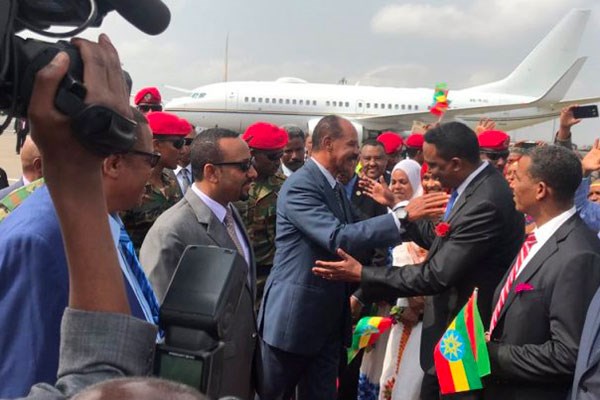
Tuesday July 17, 2018

The rapprochement between Ethiopia and Eritrea after 20 years of grandstanding is expected to have a positive security, political and economic impact in the entire Horn of Africa.
Regional security and trade will top the agenda following the joint declaration of peace and friendship signed in Asmara on July 9 between the Ethiopian Prime Minister, Abiy Ahmed Ali and Eritrean President Isaias Afeworki, normalising relations.
The two will restore diplomatic ties, resume flights by the carriers of both countries and jointly modernise the ports of Assab and Massawa.
“The state of war has come to an end and the two nations will forge close political, economic, social, cultural and security co-operation. Trade, economic and diplomatic ties will resume, the boundary decision will be implemented and both nations will work on regional peace,” said the PM’s chief of staff, Fitsum Arega, in a statement soon after the signing.
Two areas that are likely to improve immediately are border security between the countries, given that they have been accusing each other of sponsoring rebels, and the prospects of Eritrea rejoining the Inter-Governmental Authority on Development and severing its links with Al Shabaab militants.
Dr Abiy, prior to his trip to Eritrea, had mobilised parliament to remove three organisations from the classification of being terrorist. These are the Oromo Liberation Front, the Ogaden National Liberation Front and Ginbot 7, that were previously accused of receiving Eritrean military support.
Badme
Rashid Abdi, the International Crisis Group’s Horn of Africa project director, told The EastAfrican that the visit was a significant development for paving the way for the two leaders’ face to face meet after nearly two decades.
Dr Abiy, however, will have to navigate significant internal opposition in order to build consensus on how to resolve the border conflict.
“Eritrea is worried about how much Abiy can deliver. They want a quick return of the border territory as a precondition for resolving other issues. That would be difficult, though not impossible,” said Mr Abdi.
Dr Abiy, after taking power in April, had promised to recognise the disputed border town of Badme — that caused the 1998-2000 war — as Eritrean territory.
The UN-backed Eritrean Ethiopian Boundary Commission had in 2012 found that Badme belonged to Eritrea but Addis Ababa refused to hand it over.
In April 2007, Eritrea withdrew from Igad saying that the regional body was controlled by Ethiopia with the help of the US.
Igad Executive Secretary, Mahboub Maalim, said that the normalisation of relations between Ethiopia and Eritrea and the resolution of the border issue will undoubtedly benefit the people of the two countries and the entire region.
“It will contribute to the realisation of our shared aspiration of peace and economic integration of our region and indeed the continent of Africa," said Mr Maalim.
The normalisation of relations came two weeks after Eritrean Foreign Minister Osman Saleh landed in Addis Ababa on June 27 at the head of a big delegation that was welcomed by Dr Abiy at Bole International Airport.
Direct international telephone connections were also restored between the countries for the first time after two decades, while Ethiopian Airlines will be free overfly Eritrean airspace and Eritrean Airways would overfly Ethiopia.
Alias Meseret, a journalist based in Addis Ababa said that once the “no-war-no-peace” approach maintained by the two countries for many years is dropped, it will open the way for cross border trade and open the way for the lifting of the UN sanctions against Eritrea.
“There is no cross-border trade is going on except some smuggling because the border is a militarised zone. Ethiopia used to depend on the Eritrean ports of Assab and Massawa, while Eritrea was a major importer of Ethiopian products. These could all come back with improved diplomatic relations,” said Mr Meseret.
Before the war, Eritrea entrepreneurs dominant in Ethiopia exploited the coffee sector in Ethiopia, which analysts say is one of the factors that led to the war. As a consequence, some Eritrean businesses were immediately nationalised.
Kennedy Abwao, a Kenyan journalist who has covered the African Union for years, says that the peace will open the door for social elements and family ties as business drivers since there are millions of people have been unable to access their kin across the border.
He, however, believes that Ethiopia is reaching out to Eritrea to neutralise the influence of Egypt, which has been sending feelers to Asmara over the Ethiopian Millennium Dam and the issues surrounding the sharing of the Nile’s waters.